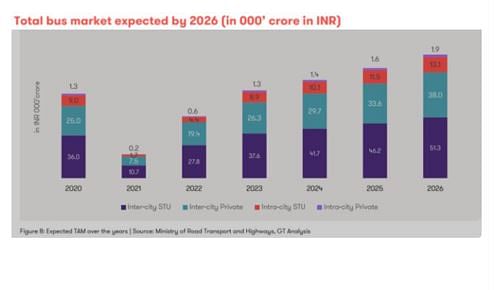
The bus industry in India is experiencing significant growth, with projections indicating a substantial increase in value by 2026. According to the report “Traveltech 2.0: The Next Phase of Digitally Empowering the Indian Traveler,” jointly produced by the IAMAI and Grant Thornton Bharat. The industry is expected to achieve a value of Rs 104,000 crores by 2026, with a compound annual growth rate (CAGR) of 6.64 per cent. This growth is driven by both State Transport Undertakings (STUs) and private buses, with STUs expected to grow at a CAGR of 6.36 % and private buses at 7.37%.
The report highlights the emergence of online ticketing as a growing trend among bus travellers. Although non-AC and intra-city bus ticketing remain predominantly offline. However, there is significant interest and uptake for online ticketing and value-added services, especially among travellers in major cities. Value-added services are becoming increasingly common in city buses, presenting opportunities for private sector involvement.
OTA Technology
In addition to the bus industry, the report also addresses the potential for OTAs in the Indian railways sector. They can particularly target reserved ticketing segment. The shift to digital ticketing not only benefits the Indian Railways in terms of operational efficiency. This also offers OTAs opportunities to enhance user convenience and innovate tariff structures.
Also Read: Domestic CV industry volumes to decline in Q4 FY2024: ICRA
Bus unreserved passengers constituting a substantial portion of the total passenger count. The collaboration between CRIS and private OTAs emerges as a transformative opportunity. The shift to digital ticketing not only reduces operational burdens for the Indian Railways. This also offers private OTAs an avenue to innovate tariff structures and enhance user convenience. This synergy holds the potential to elevate the passenger experience, alleviate infrastructure strain, and foster a symbiotic relationship. This will result in yielding efficiency gains for the railway system and expanded market opportunities for the private sector.

Leadership Insights
“Technology is revolutionising the way we travel, making it easier to use than ever before. Chalo is thrilled to support the publication of the Travel Tech report. I’m confident that it will spark meaningful conversations and shape positive policies that will ensure that we leverage technology in the best possible way to make city bus travel better,” said Dhruv Chopra Co-founder and CMO, Chalo, speaking at the launching of the report at the India Digital Summit 2024 on February 28.
Commenting on the launch of the report Aloke Bajpai, Chairman, Managing Director and Group CEO, ixigo said “Railways and buses are revolutionizing the ground transport segment in India. With infrastructure development, increased internet penetration, modernisation, and improvement in service quality with OTA-driven tech upgrades, this segment is poised for further growth. By leveraging technology, OTAs are empowering travelers to make smarter travel decisions, and are playing a leading role in driving online adoption in the ground travel sector.”
“The next evolution of travel tech will happen as we unlock the full potential of OTAs in the ground transport business. That’s the key message from the IAMAI Travel Tech report. It is important to remove tax disparities between e-commerce operators and e-commerce suppliers in the domestic market. Currently, a customer pays a 5% GST charge when booking a non-AC bus through an e-commerce platform. This charge is zero for a direct booking from a bus operator, irrespective of whether it is done in online or offline mode,” said, Prakash Sangam, CEO, Redbus
Future Outlook
Addressing the same session Vikash Jalan, Chief Business Officer, PayTM Travel, commented, “The new IAMAI Travel Tech Report explores the role of technology in shaping India’s travel landscape, highlighting the impact of OTAs on ground transportation and calling for collaboration to bridge the digital divide and unlock the full potential of travel technology.”
Key industry players, including Chalo, ixigo, Redbus, and PayTM Travel, have expressed optimism about the role of technology in India. They emphasize the importance of leveraging technology to empower travelers. This will drive drive online adoption, and bridge the digital divide in ground transportation.
Furthermore, stakeholders have called for policy changes to address tax disparities between e-commerce operators and suppliers in the domestic market. This includes reconsidering GST charges for bookings made through e-commerce platforms. They are compared to direct bookings from bus operators, regardless of whether they are conducted online or offline.







